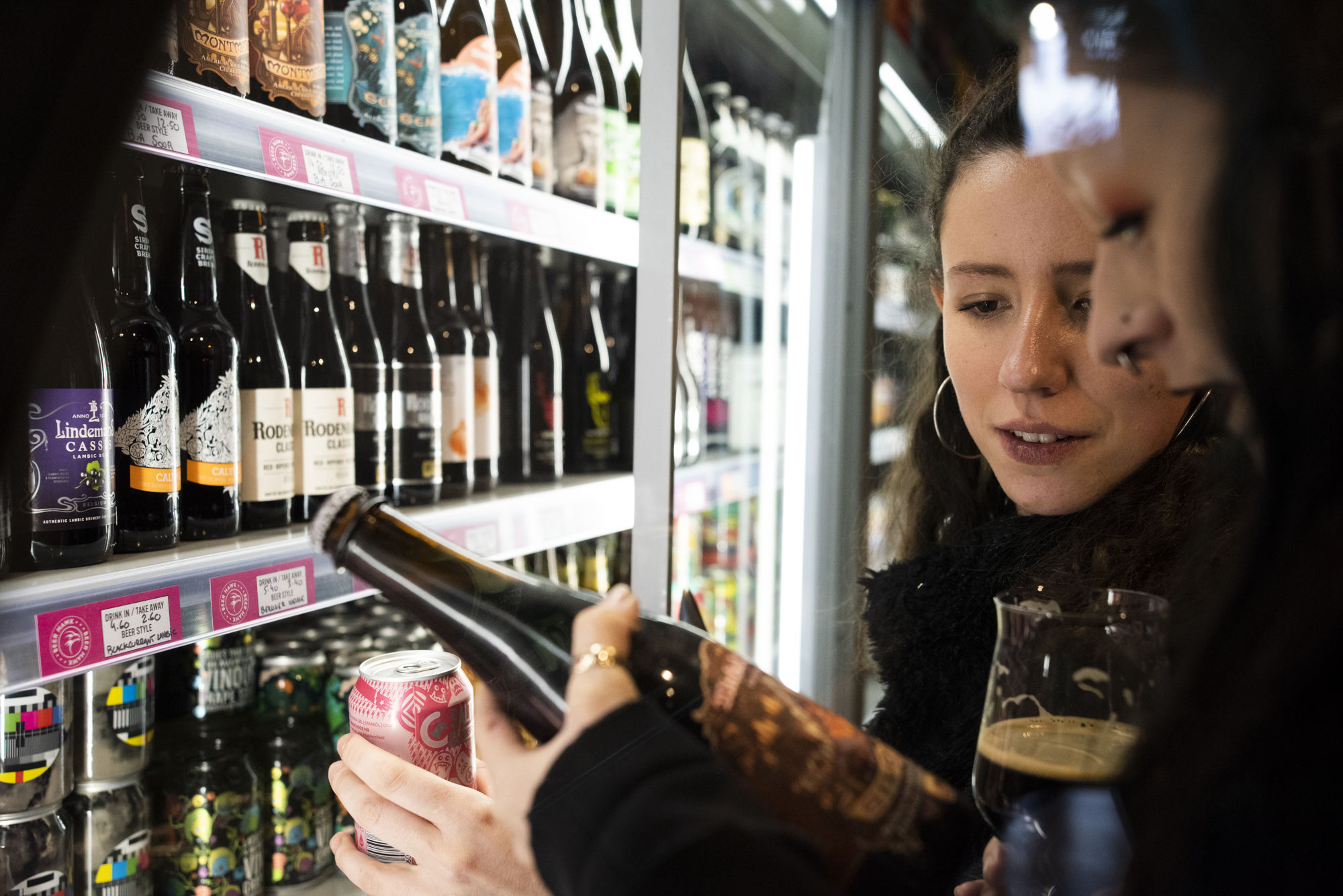THE GIST
Over two consecutive days late last week, two deals were announced that will result in Anheuser-Busch InBev's increased penetration into the British beer market. Both concerned retailer Beer Hawk, which was acquired by AB InBev's investment arm, ZX Ventures, in 2016. Both also hint at a strategy designed to answer a seismic shift in beer-buying and consumption habits in the U.K.—namely, that more beer consumers are staying home with their drinks than ever before.
On Thursday afternoon, BeerInsider.com published an article that appeared to indicate Beer Hawk had acquired "the remnants" of failed wholesale, retail, and import business The Bottle Shop, which ceased doing business in March.
Then, on Friday, Beer Hawk revealed it had acquired online beer subscription service BeerBods for an undisclosed sum. In a blog post on the company's website, Beer Hawk co-founder Mark Roberts wrote that he would be working with the company "to help build the U.K.’s leading retailer of craft beer."
BeerBods founder Matt Lane shared the news with his customers via email the same day.
“I’m incredibly proud of everything we have achieved to date, Lane wrote. “Having said that, we want to do more. Much more. It has become increasingly clear that in order for BeerBods to reach its full potential, we need a partner that can help take us to the next level.”
Over the weekend, GBH confirmed that Beer Hawk had not acquired all of The Bottle Shop's former assets, but had only secured rights to the lease of its warehouse in Canning Town, East London. GBH also learned that Beer Hawk was working to buy one of The Bottle Shop's former retail sites, but had not yet concluded any such deal. Roberts did not confirm whether this was the site at the heart of London's "Bermondsey Beer Mile"—a highly desirable location for any beer business.
WHY IT MATTERS
"We're trying to get as many people drinking better beer as possible," Lane said when asked about the deal, echoing his company’s slogan of “drink better beer.” "We need a partner that can help us scale and do what we do better, and we feel like Beer Hawk was the best one to do that."
This expansion of Beer Hawk's activities comes at a time when more Brits than ever are choosing to drink at home. 53.1% of beer sales in the U.K. were made through the off-trade in 2017—according to the latest figures available from the British Beer and Pub Association (BBPA)—compared to 46.9% through the on-trade.
Since 2000, the amount of off-trade sales as a percentage of all beer sold in the U.K. has increased from 32.2% to 53.7% of total sales. To put that in perspective, the growth in total beer sales has actually decreased by 22.6% in almost two decades, while sales for beer to take home have shown 29.3% growth.
Over the same time period, the number of pubs in the U.K. has declined from 60,800 in 2000 to 48,350 in 2017, while the number of retailers selling drinks to consume off the premises increased from 52,179 in 2000 to 61,395 in 2017. Off-trade sales of craft beer in the U.K. are largely made through specialized retailers, with only a small selection of breweries represented in supermarkets and other general retailers.
Given the rapid growth of off-trade sales while overall beer sold has actually decreased, ABI’s renewed focus on the retail sector of the industry is a likely indicator of where, and how, it believes its customers will choose to drink beer in the future. The multinational is no stranger to owning businesses up and down the sales chain, from brewery to distribution to retail. But until now, it has not had this sort of vertical integration within the U.K.'s craft-beer sector.
These moves into brick-and-mortar and digital sales, and wholesale spaces, represent novel, modern inroads into the underlying structure of the U.K.'s craft beer market. With Beer Hawk, ABI owns a wholesaler and importer. With newly acquired rights to the lease on The Bottle Shop’s warehouse, it gains existing cold-chain infrastructure and warehouse space in the capital (allowing for beers imported from overseas to be kept in better condition). And with BeerBods, it has an established beer-subscription service that delivers directly to consumers’ homes.
This isn't the first time the multinational has worked to gain this kind of vertical integration. In 2016, ZX Ventures' nascent days, the investment arm went on a similar spending spree in Brazil. It took a stake in Zé Delivery, an on-demand beverage service, and beHoppy, a rating app similar to Untappd. These connections could then also be tied to Empório da Cerveja, an online retailer, and Bar do Urso, a series of bars, all backed by ZX Ventures. (Additional details of these investments and how they reflect on last week’s moves in the U.K. can be read in this story.)
Dealings related to The Bottle Shop's liquidation mark a renewed interest from ABI’s Beer Hawk in expanding its wholesale trade platform, which has been operating for 18 months. Andrew Morgan, who founded The Bottle Shop, will be joining Beer Hawk to oversee this area of its operations. Roberts said that Beer Hawk plans to accelerate its wholesale activities, and that Morgan possessed unique skills to achieve that.
BeerBods, founded in 2012, was one of the first companies in the U.K. to establish a subscription model for delivering beer to consumers’ homes. Perhaps ironically, Beer Hawk also started its own version of that service the same year.
While other such services have since come along, very few have matched BeerBods’ reach in terms of marketing and consumer awareness. Of the 20 or so such companies to have launched in the U.K., BeerBods remains one of only a handful to regularly appear in the press, for example. This may be due in part to one unique aspect of the business: BeerBods also functions as an online beer club, which includes common beers in every delivery so subscribers can drink them simultaneously and discuss them on Twitter at 9 p.m. each Thursday night.
[Disclosure: Our writer is a former BeerBods subscriber, and previously contributed two articles to its blog.]
Roberts, who has been working under the ownership of ZX Ventures for three years, says he is under no pressure to stock ABI products on the Beer Hawk website. At the time of writing, GBH counted beers from 44 breweries listed on the site, with six owned by ABI. Over the last 12 months, the site’s top-three beers were Mount Saint Bernard Abbey’s Tynt Meadow English Trappist Ale, Big Drop Brewing Co.’s Pale Ale (alcohol-free), and Augustiner Helles.
"We were very clear that we wanted to maintain all of the decision-making, accountability, and autonomy for growing Beer Hawk, and that's why Chris and I both stayed on as founders,” he tells GBH. “We're both still there. We're both being strong, and one of those really important principles is that we have the opportunity to do what we think is right for the Beer Hawk brand. And that categorically means that we have total discretion over what beers we list on our site."
Similarly, Lane said BeerBods staff would retain control over the selection of beers for subscribers' monthly boxes, and he did not expect pressure to include ABI beers.
"Before this deal the criteria for the beers we picked was it has to be a well made beer, and it has to have a decent story behind it,” Lane adds. “That was our policy when we were picking beers before the deal, and that'll be our policy afterwards."
Andrew Morgan declined to comment for this piece, but Roberts told GBH that Beer Hawk, via its trade operations, will have a similar autonomy to work with any craft breweries it chooses. Whether The Bottle Shop's former trade customers, many of them fiercely independent breweries, will want to work with Morgan again remains to be seen. When it collapsed, The Bottle Shop reportedly left many small breweries with large debts, and owed £89,862 ($112,578) to The Kernel Brewery alone. Morgan, in his interview with BeerInsider, appeared to blame others for his company’s collapse and called the craft beer industry “juvenile.”
The Bottle Shop was one of the major distributors in the U.K. craft beer sector, but it was far from the only one.
“There are sufficient options for the smaller brewers who don't want to do distribution themselves, who just want to concentrate on making good beer,” said Martyn Railton, managing director of importer and distributor Euroboozer. “I can't see [Beer Hawk’s wholesale arm] muscling into the customer base that we have, which is craft beer. To do that, you need incredible, standout products. I'm not sure the people producing the incredible standout products are actually going to want to do business with the newfangled ABI vehicle.”
Beer Hawk opened its first brick-and-mortar outlet in 2018 and now has two locations, both of which follow the hybrid bar-and-bottle-shop model that has become increasingly popular among specialist craft beer retailers in the U.K.
If Beer Hawk succeeds in acquiring one of The Bottle Shop's former retail locations, it will, in some ways, simply be an expansion of its existing business. But if that site does indeed turn out to be The Bottle Shop’s main London retail premises on the Bermondsey Beer Mile, it will hold some extra significance.
The location has been the home of craft beer in the capital for almost a decade, with early resident breweries including The Kernel (opened in 2010), Brew By Numbers (2011), and Partizan Brewing (2012). It still regularly attracts crowds of weekend drinkers keen to experience craft beer at the source. The area's reputation also goes beyond beer. For 10 years, businesses like cheesemongers Neal's Yard Dairy, Monmouth Coffee, Borough Market, and others have worked together to create a solid home for independent businesses.
If Beer Hawk were to acquire The Bottle Shop’s former retail site on the Beer Mile, ABI would not be the only multinational brewer to gain a foothold in the area. Fourpure Brewery was taken over by Lion (a subsidiary of Kirin) last year.
Some small brewers interpret a less-than-authentic intent behind these recent forays. Paul Jones, founder of the Manchester-based Cloudwater Brew Co., which maintains a taproom on the Bermondsey Beer Mile, says these kinds of moves are part of the “game plan” of larger companies. Via its online store, Cloudwater also ships its beers directly to consumers from its coldstore; Beer Hawk’s latest acquisitions would put it further into competition with the multinational.
“Hide the real ownership, hide the real intentions,” he tells GBH. “I don't think it serves the intent of essentially a decade’s worth of work very well, to have a global brewing corporation sliding through the back door."
But ABI’s desire to establish a mixed on- and off-trade retail outlet in an area closely associated with high-quality food and drink of all kinds, and beer in particular, matches the motives behind its acquisition of BeerBods. It wants to be there because that’s where the customers are.
More broadly, it seems ABI has taken note of the shift in consumer behavior away from Britain’s traditional pub culture and towards drinking at home. It has seen this behavior from consumers in other markets. As a result, it has now moved decisively into the U.K.’s craft beer retail ecosystem.


